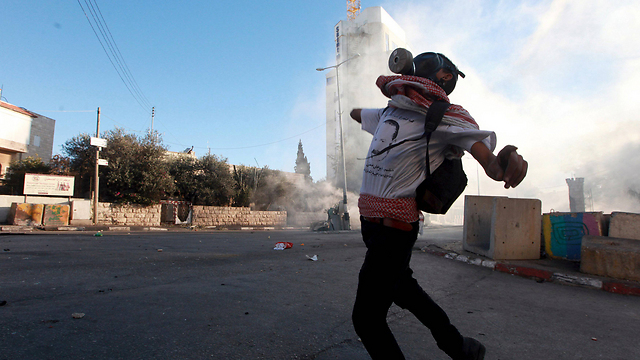
POLL: 42% of Palestinians support a 3rd intifada, Abbas would win a mere 36% of the Palestinian vote compared to Hamas leader Ismail Haniyeh, who would get a measly 22%.
By Elior Levy
Less than half of the Palestinians support a third intifada, a recent poll has shown, compared to 63 percent who supported the violence at the beginning of the current escalation.

Palestinian riots in Bethlehem – Photo: Reute
According to the survey, conducted last week in the West Bank and Gaza Strip, only 42 percent of Palestinians support a third intifada, a sharp drop from the 63 percent who supported it in November.
However, the question that was posed to respondents focused on an intifada that has not yet erupted. Perhaps the intention is for an armed intifada similar to the second intifada.
The survey was conducted by Awrad, a Palestinian research institute that is considered reliable and prestigious, and whose publications are taken seriously.
Despite frequent threats by Palestinian leader Mahmoud Abbas and other officials in the Palestinian Authority to dismantle the Palestinian Authority and return control over the territory to Israel, the survey found that only 14 percent support such a move, while 79 percent are against it.
The survey also examined the politicial views of the Palestinians, finding that if elections were held today in the West Bank and Gaza, Fatah would win over Hamas. In the presidential elections, Abbas would win 36 percent of the vote compared to Hamas leader Ismail Haniyeh who would only get 22 percent. But none of them should rest on their laurels, because 41 percent of the Palestinians said that they have yet to decide for whom to vote or whether to vote at all.
Even in the parliamentary elections, if they were held today, Fatah would defeat Hamas. According to the survey, 39 percent would vote for Fatah compared with only 17 percent for Hamas. Here also, a number of undecided voters who are did not decide or those who said they would not vote is high, at 34 percent.
This statistic that should worry Hamas in Gaza is that 92 percent of Gazans support holding elections, suggesting dissatisfaction on their part. Another factor that strengthens this belief that 56 percent of Gazans agree with Abbas’s claim that Hamas is not interested in establishing a national unity government and holding elections.
The survey further found that 58 percent of Palestinians are unconcerned about a scenario in which Abbas resigns. Two-thirds of them believe that if they do so, the preferred option is to conduct elections in order to find a replacement. A solid majority also believes that there is a need to resume the post of vice president, which is not currently manned. According to the Palestinian constitution, the vice president replaces the president if he resigns, dies, or is unable to fulfill his duties.
In general, most respondents believe that Palestinian society is not going in the correct direction. Two-thirds of West Bank residents indicated that they feel that the security situation has deteriorated in their area of residence.
This survey is likely to be met with relief at the Muqata in Ramallah, after a poll conducted by another surveyor, Khalil Shikaki, published in December raised the alarming claim that two-thirds of Palestinians support armed struggle against Israel and showing a steep drop in support for Abbas.
Shikaki’s survey shocked Ramallah and led Abbas to make series of statements signaling hope and appealing to the younger generation. It contrasted with the despair expressed in his speech in the UN General Assembly that according to some estimates was one of the catalysts that led to the outbreak of escalation.
View original Ynet publication at:
http://www.ynetnews.com/articles/0,7340,L-4763051,00.html






 Israeli New Shekel Exchange Rate
Israeli New Shekel Exchange Rate